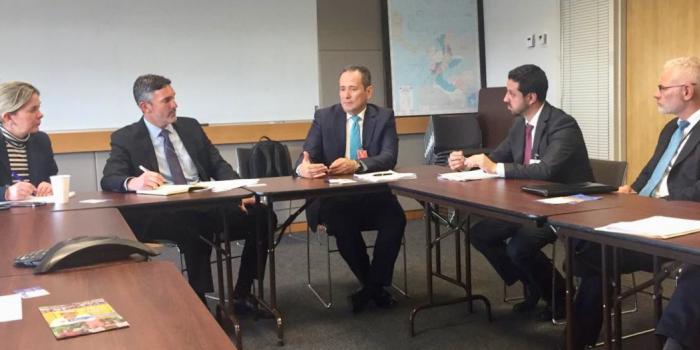
Unit and Cooperation Agency USAID seek to support the sustainability of victims
In order to find opportunities for cooperation for the benefit of victims of armed conflict, the director of the Victims Unit, Ramón Rodríguez, and the director of the United States Agency for Development (USAID), Lawrence Sacks, met.

At the United States Embassy in Colombia, a high-level meeting was held between the Victims Unit and the United States Development Agency (USAID) to agree on lines of work in order to achieve the sustainability of the survivors of armed conflict in the national territory.
The meeting was led by the director of the Victims Unit, Ramón Rodríguez, and the director of USAID, Lawrence Sacks, who expressed their suggestions and agreed on upcoming meetings of their technical teams to finalize the proposals in favor of the victims.
Ramón Rodríguez related the needs of the Unit to strengthen and accelerate the processes of integral reparation and raised the need to prioritize the management of psychosocial support to the victims and the strengthening of the ties of inter-institutional support among the entities that are part of the Integral System of Comprehensive Care and Reparation for Victims (Snariv).
For his part, Lawrence Sacks, requested a list of the specific needs of the Unit to review opportunities for cooperation, according to the projects in his country.
Among the issues agreed to prioritize are: environmental, ethnic, income generation and productive chains. The goal is to achieve the sustainability of those who were victims of the armed conflict and prevent them from being revictimized.
Since the Victims Act (1448 of 2011) entered into force, USAID has been an important ally of the Unit. Through the Colombia Transforma program, it has supported the strengthening at the territorial level of the representatives for the adequate development of the election process of the Victim Effective Participation Tables.
In addition, with the operation of the International Organization for Migration (IOM), USAID has supported in a complementary manner the implementation of the public policy of victims in relation to the Institutional Strengthening for Victims (VISP) program, whose actions include the implementation of functional rehabilitation services in five hospitals in the municipalities of Quibdó, Apartadó, Popayán and Cartagena and the training of 1,000 professionals in the areas of health, public officials and victims on different topics including psychosocial care, sexual violence , forced disappearance, and children's services.
(END/DRR/DFM)






